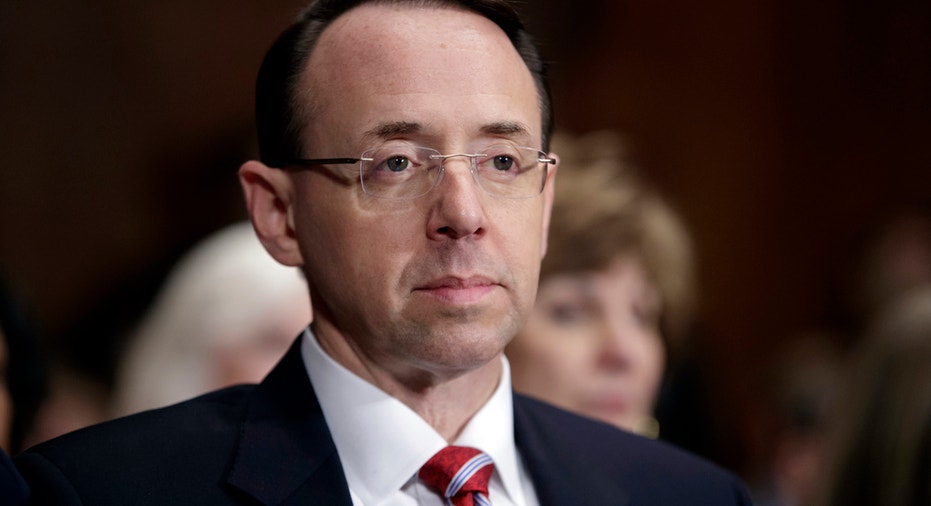Special counsel's office interviewed Deputy Attorney General Rod Rosenstein

Special Counsel Robert Mueller's office has interviewed Deputy Attorney General Rod Rosenstein about President Donald Trump's firing of former FBI Director James Comey, according to people familiar with the investigation.
The interview, which occurred in June or July, presents the unusual situation of investigators questioning the person directly overseeing their probe. Mr. Mueller's office is investigating Russia's alleged meddling in the 2016 election, whether any associates of Mr. Trump coordinated with Moscow's efforts, and related matters.
Mr. Mueller as special counsel has a good deal of independence, but he ultimately answers to Mr. Rosenstein, because Attorney General Jeff Sessions recused himself from the investigation.
The special counsel's handling of the interview could be a sign that Mr. Mueller's team doesn't view Mr. Rosenstein as a central witness in its probe, as the deputy attorney general hasn't withdrawn himself from overseeing it since that interview. A key witness would likely have to take such a step.
"It is unusual," said Peter Zeidenberg, a former federal prosecutor. "But my inference is that they are not viewing him as a potential critical witness, because either the testimony isn't that critical or there are other people that can say the same thing."
Ian Prior, a spokesman for the Justice Department, said in a statement, "As the deputy attorney general has said numerous times, if there comes a time when he needs to recuse, he will. However, nothing has changed."
Mr. Mueller's office declined to comment.
The federal probe was initially led by Mr. Comey. After the president fired him, Mr. Rosenstein named Mr. Mueller to serve as special counsel. Mr. Mueller is authorized to investigate any matters arising from his examination of the alleged Russian meddling.
Mr. Trump has denied any involvement with Russia and has decried the investigation as a "witch hunt." Russia has denied U.S. intelligence agencies' findings that it sought to influence the presidential election.
Messrs. Rosenstein and Sessions met with Mr. Trump on May 8 to discuss the president's displeasure with Mr. Comey's handling of his job, The Wall Street Journal has reported. Mr. Trump handed Mr. Rosenstein a memo at that meeting in which he laid out his arguments for wanting to fire Mr. Comey. Mr. Rosenstein has provided that memo to the special counsel's office.
The next day, Mr. Rosenstein wrote his own memo highly critical of Mr. Comey's job performance, particularly his handling of the investigation into former Secretary of State Hillary Clinton's private email server. Mr. Rosensteinwrote that over the preceding year "the FBI's reputation and credibility have suffered substantial damage."
Mr. Trump then fired Mr. Comey, and the White House distributed to the media Mr. Rosenstein's memo as justification for the decision. Mr. Trump also publicly cited Mr. Rosenstein's advice as playing a role in his decision.
However, two days after the firing, Mr. Trump told NBC News that the Russia probe had been on his mind when he removed the FBI director.
"I said to myself, I said, 'You know, this Russia thing with Trump and Russia is a made-up story, it's an excuse by the Democrats for having lost an election that they should have won,' " Mr. Trump said.
In the interview with the special counsel's office, Mr. Rosenstein said that in the May 8 meeting with Mr. Trump, the president said that he knew that firing Mr. Comey wouldn't end the Russia investigation and that it could create additional problems for him, according to a person familiar with the interview.
Mr. Comey in June told the Senate Intelligence Committee, which is conducting its own investigation into alleged Russian meddling in the election, that Mr. Trump had urged him to ease off an investigation into Michael Flynn. Mr. Trump has denied that. Mr. Flynn was forced to resign as Mr. Trump's national security adviser in February for giving misleading statements to administration officials about his contacts with Russian officials.
Mr. Rosenstein told investigators that the president shrugged off any potential consequences for firing Mr. Comey, telling Mr. Rosenstein that he didn't like the FBI director and wanted him out of government, the person said.
The special counsel has been investigating whether Mr. Trump sought to obstruct justice by firing Mr. Comey. Legal experts say proving Mr. Trump obstructed justice would be difficult for a variety of reasons, including his authority as president to fire the FBI director.
Lawyers representing Mr. Trump have provided memos to the special counsel laying out their arguments against a finding of obstruction, The Wall Street Journal has reported. The memos were also sharply critical of Mr. Comey's reliability as a witness.
--Erica Orden contributed to this article.
Write to Aruna Viswanatha at Aruna.Viswanatha@wsj.com and Del Quentin Wilber at del.wilber@wsj.com



















